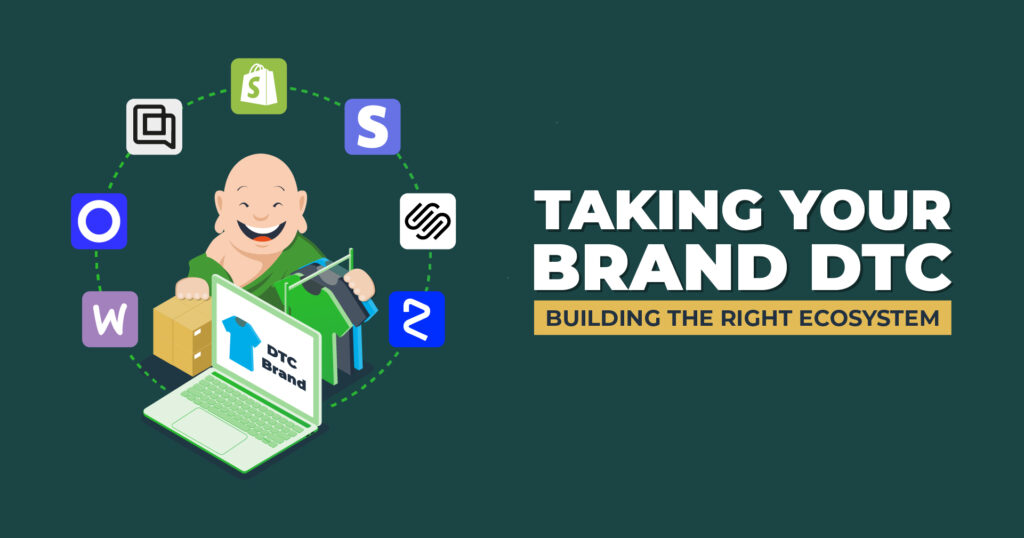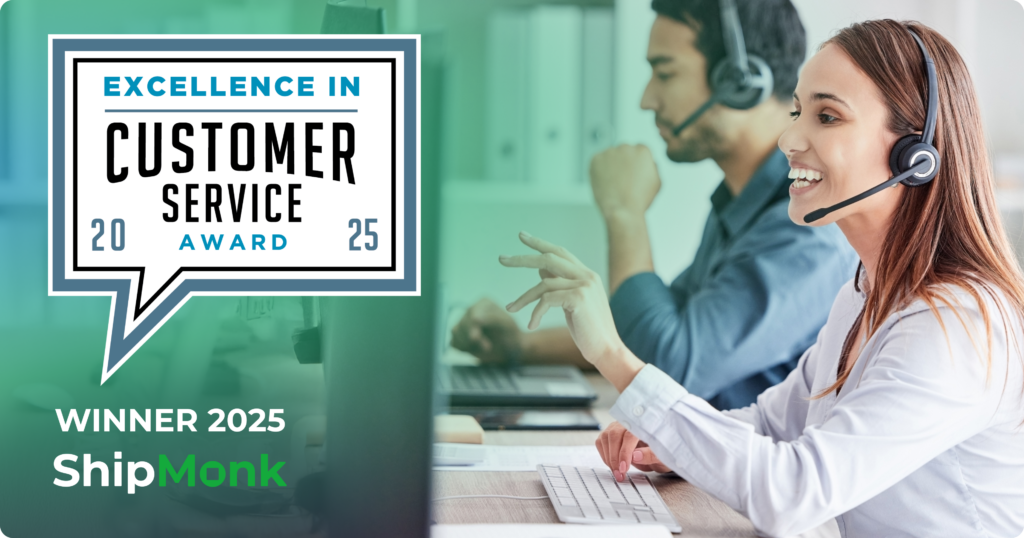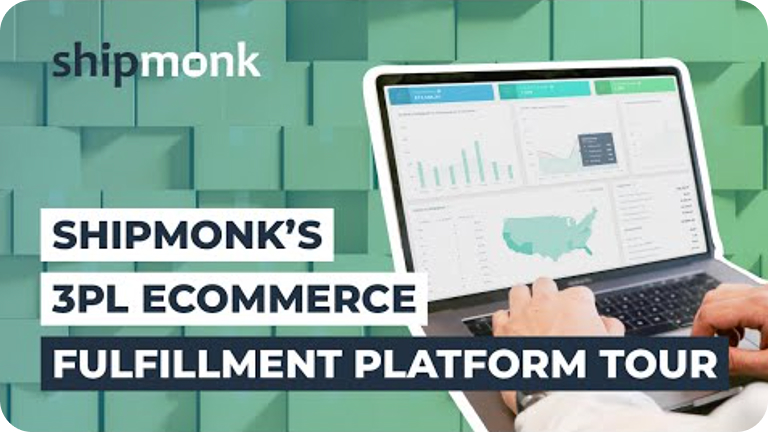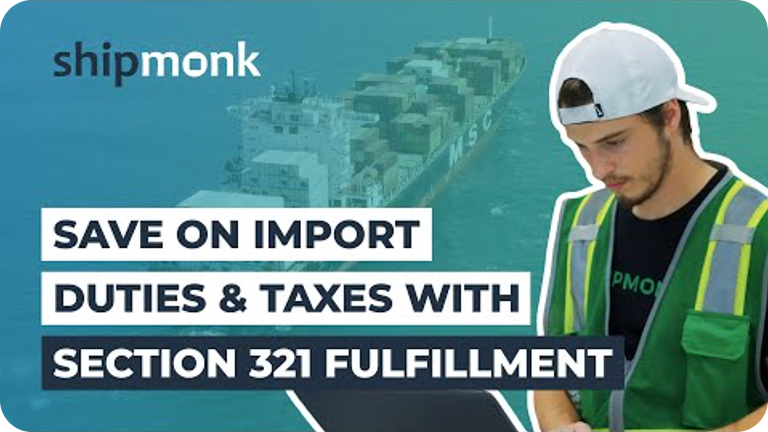You hear it everywhere. “Retail is dying! The future is ecommerce!” Some of the hype is actually true. Today’s consumers do expect to find their favorite brands online. They want to know where products are manufactured and what goes into them. They want to read reviews and they want to get the perfect fit, just like they would if they shopped in a store.

In response to the online shift, retailers with deep pockets have built online storefronts and created their own marketplaces to protect their market share. But what if your pockets aren’t so deep? What if you’re a small, local retail boutique that wants to expand your reach with a direct-to-consumer (DTC) sales channel? Or you’re a successful brand on Amazon that wants to break free and manage your own storefront and fulfillment?
Going direct-to-consumer is not easy. For a brand used to selling in bulk to Amazon or a few retail customers, adding a DTC sales channel means building an entirely new ecosystem of people, partnerships and technology. In a previous blog, we covered the challenges and opportunities that come with taking a wholesale brand DTC. This article is intended to be more of a how-to guide. What exactly does a wholesale brand (or any brand, for that matter) need in order to launch and maintain a DTC ecommerce sales channel?
People First
Launching a direct sales channel requires a different set of skills than selling your wares at a retail trade show. You need to build and maintain an online store, process customer orders and payments, pick, pack and ship orders, manage returns, and handle customer service issues. Oh, and then there’s the digital marketing team tasked with bringing in traffic.
There are two ways to get these people on your team: 1) hire them, or 2) outsource the function to a third-party provider that has the expertise you need.
Web Design & Development
Design — Your website should clearly communicate your brand personality and values, differentiating you from other brands whether you’re selling high-end cosmetics or bulk dog food. You can either build your own website, or take advantage of robust shopping platforms like Shopify and BigCommerce, and that can be adapted to your brand. If brand image is important, an experienced web designer should be high on your list.
Customer/User Experience (CX/UX) — Your website should be easy to use. Products should be easy to find and provide helpful product descriptions, detailed size guidance, photography, reviews – everything it takes to help customers make informed decisions and prevent returns. It should also be responsive, (i.e., seamlessly convert to whatever size screen your customer is using). Lastly, checkout should be smooth, follow-up emails personalized and automated, and shipping tracked. Brand-ready shopping platforms tout seamless shopping experiences, but you’ll still need somebody to manage this.
Search Engine Optimization (SEO) — You will need expertise in search engine optimization to improve your website’s chances of showing up in organic search results.
Maintenance — Your website will need ongoing maintenance, not just in terms of software functionality, but also to manage product assortment, stockouts, seasonality, promotions, and much much more.
Returns — Your fulfillment provider may be able to handle the physical aspect of merchandise returns and get products back on the shelves quickly. There are also third-party returns companies that also do this. Return Merchandise Automation (RMA) software can automate the approval process and help steer your customers toward exchanges instead of returns.
Digital Marketing
Search Engine Marketing — SEM is the practice of using paid online advertising to build brand awareness and traffic to your website.
Social Media — From sharing events and new products to responding to negative reviews, social media platforms represent the best opportunities you have to engage directly with your customers. You’ll need someone to manage it.
Email — One of the main benefits of going direct is that you can build a list of customers who are loyal to your brand that you can regularly communicate with. You’ll need someone to manage this list and create emails, texts, and other communications from automated notifications to newsletters and promotional emails.
Loyalty Programs and Subscriptions — These have been around since the age of the milkman, but the internet has made them an easy way for many DTC brands to drive recurring revenue. There are marketing platforms that can help you create these programs, as well as marketing agencies that can manage them for you.
Content Building — Would you like to give your brand a voice? Show your product in action? Blogs, newsletters, videos and other forms of online content allow you to bring your products to life, share knowledge and ideas, and set yourself up as a leader in your brand category. Start writing.
Customer Service — Who’s going to take the phone call and troubleshoot when a package doesn’t arrive, or contains an incorrect or damaged product? Who’s going to authorize a return when a customer is unhappy? You can fill this function in-house, or outsource it.
Inventory Management — Managing inventory in a DTC fulfillment center is similar to managing inventory in a wholesale distribution center, except that instead of tracking 30 pallets of the same SKU, you’re tracking 30,000 units. You still need to forecast demand, make sure you have enough units on hand to fill orders, and reorder in time to avoid stockouts. The more SKUs you have to manage, the more people you’ll need for this.
Partnerships
Sometimes it makes sense to hire people; other times it makes sense to form partnerships. DTC order fulfillment and small-parcel shipping are two functions that should be outsourced to experts.

Direct Fulfillment
Fulfilling small orders to individual customers is a whole different universe than shipping a pallet of units to an Amazon warehouse. If you’re going to be successful, your DTC fulfillment operations need to be efficient, accurate, and meet the expectations of some very demanding (and vocal) customers. For all but the biggest wholesale brands, the overhaul is so tremendous that it’s not worth it to fulfill orders in house. It makes much more sense to outsource fulfillment operations to a third-party logistics (3PL) provider.
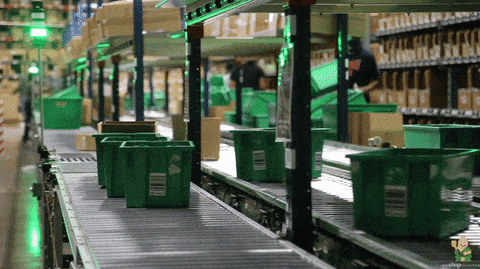
An advanced 3PL like ShipMonk has already made the investments in automation, technology, and warehouse space that DTC brands need to succeed. Their operations are optimized for accuracy and efficiency, and they’ve got small parcel logistics down to a science to help brands save on shipping. They can help you build a tech stack that integrates with their warehouse management system to give you real-time visibility and control over the fulfillment process. Here are some of the reasons partnering with a 3PL makes sense:
Warehouse Automation — 3PLs invest in automation because the more orders they can fill in a day, the more easily they can handle spikes in order volume, peak holiday seasons, and the needs of rapidly growing ecommerce brands. By helping brands scale, they grow their own business.
Integrated Order, Inventory, and Warehouse Management Systems — State-of-the-art fulfillment platforms like ShipMonk’s make it easy to track and control orders, monitor inventory levels, automate reorders and collect valuable real-time data about your DTC sales and fulfillment.
Accurate On-Time Delivery — It’s the promise you make to your customers, and it’s the main reason you hire a fulfillment partner. Breaking this promise creates angry customers. Fast, efficient pick and pack services with multiple checkpoints ensure accuracy and get your orders out the door on time.
Special Services — A full service 3PL might offer kitting and assembly services, or help with special projects like removing or affixing labels, and unboxing and repackaging bulk freight.
Branded Packaging — Unlike an Amazon delivery, every DTC order delivery is an opportunity to make an impression. Don’t waste that moment. A 3PL like ShipMonk is happy to package your orders according to your brand’s specifications. Branded boxes, sustainable packing material, and personalized inserts are all possible. No pressure, but there are whole YouTube channels devoted to unboxing products.
Data Collection — Powerful warehouse systems use barcodes to track merchandise from receiving through delivery. As orders are filled and shelves are restocked, inventory data is automatically updated. Dashboards show real-time information, and you can automate custom reports to manage your business.

Shipping
The freight carriers you partner with don’t handle small parcels, so those discount rates you’re accustomed to won’t apply to DTC shipping. You would need huge sales volume to be able to match the shipping rates your retail partners are offering, which is nearly impossible for a single brand. The simplest solution is to partner with a 3PL that ships thousands of small parcels every day.
A third-party logistics provider like ShipMonk not only picks and packs your orders, they can help you save on shipping. Rather than tie themselves to a few shipping companies, ShipMonk’s Virtual Carrier Network automatically selects the most economical carrier and route for each order, from all the major companies and multiple shipping methods. And ShipMonk’s massive shipping volume ensures that your brand, as one of their ecommerce clients, would qualify for shipping discounts you could never get on your own. Incidentally, ShipMonk can also help you with retail fulfillment and freight shipping.
Technology
Launching and maintaining an ecommerce business requires a significant investment in technology, from front-end shopping platforms to fulfillment operations to back-end financials and data analysis. In the fulfillment world, this is known as a tech stack. Each layer needs to integrate with the others, there are multiple apps and platforms for each function, and the technology is constantly evolving. So how do you know which apps and platforms are right for your brand?

Well, that depends on your brand. What retail category does your brand fall into? How many SKUs do you have? Do your products require special treatment, such as temperature-controlled storage? Will you be selling internationally? Importing goods to sell in the U.S.? Are your current customers clustered in a certain geographic area?
Because your fulfillment center is at the center of all the action, they know what works and can recommend the perfect combination of technologies to meet your needs. ShipMonk’s advanced 3PL platform offers seamless integrations with dozens of shopping platforms, marketplaces, payment systems, inventory and order management systems, inbound freight and outbound shipping carriers, return merchandise authorization systems and much more. Some of these solutions you’ll need immediately, and others you can grow into.
Tech Stack Essentials
- Shopping Platform
- Payment Gateway
- Order Management System (OMS)
- Inventory Management System (IMS)
- Warehouse Management System (WMS)
- Small Parcel Shipping Solution
Tech Stack Add-ons
- Return Merchandise Authorization (RMA) System
- FinTech Solutions such as Buy Now/Pay Later
- Subscription Platform
- Automated Sales Tax Solution
- Customer Service & Support Portal
- Cross Border Solution for International Shipping
- Customs Brokerage & International Freight Forwarding Service
- Banking Services
- MarTech Solutions
- ERP Integrations for Data Analysis
- Supply Chain Integrations for Incoming Freight
- Customer Relationship Management (CRM)
Your Partner in DTC
Building the right ecosystem for a successful DTC brand isn’t easy, but partnering with a 3PL can make all the difference. You’ll get built-in DTC expertise, smooth integrations, advanced technology, warehouse automation, and small-parcel shipping capabilities all in one place. Best of all, a 3PL can be a tremendous resource in helping your ecommerce business scale. Contact ShipMonk today and let us create a custom DTC solution that works for your brand.

